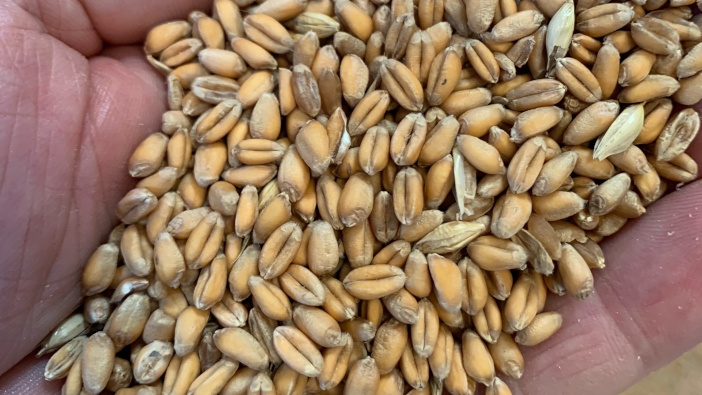Godminster Farm, an organic enterprise based in Bruton, Somerset, has reportedly seen its best-ever harvest this summer thanks to a robust wheat blend that has saved on labour and boosted yields.
When Richard Hollingbery bought the farm, he pursued fully organic principles, with projects for woodland creation to benefit the local wildlife.
Pete Cheek, organic farm manager, said: “We tried our first (hard) wheat blend – Apex, with 50% Nelson and 50% Extase – on the advice of Cope Seeds in October 2021 and we harvested it this August (2022).
“It is brilliant; one of the best harvests we have ever had,” he added, before saying that the blend has had far more vigour than a straight variety.
“We drill the wheat 90 kilos to an acre. Our blended wheat yields 0.8 of a tonne more than non-blended.
“Blended wheats have been around for a good few years and lots of arable farmers have been talking about them, so we thought we would have a go.
“The beauty of blending two varieties is that if one fails, the other picks up and runs!”
The hot, dry weather has produced a much cleaner wheat crop than usual, with weeds and diseases kept at bay.
“Spring wheat didn’t do so well because of a cold seed bed and lack of moisture but the winter wheat crop was above average; a blend gives you a second bite of the cherry for a yield,” Mr Cheek said.
“Our farm has a heavy bias towards dairy and the cattle who feed on the wheat blend and over red clover leys, produce organic manure that boosts the soil’s fertility. The wheat is established in October and is left alone until harvest. It requires no ploughing and minimum tillage and the crops enhance the red clover by giving it a deeper tap root.
“We feed all of our wheat to our dairy cows to make milk and cheese. We’ve seen endless environmental benefits, such as lovely big hedges, species-rich grasses, wildflowers and herbal leys.
“We grow the right crops at the right times. Blended wheat from Cope Seeds suits our system and lessens the work.”
Gemma Clarke, managing director of Cope Seeds, said: “It was clear from work being done overseas, that growing blends offered arable farmers increased resilience and diversity.
“We decided to use our knowledge of varieties to create a range of blends that work both agronomically on farm, and were suitable to end users too. We’re absolutely thrilled with the comments we are receiving from growers including Godminster, who grew our blends this season.”
Mr Hollingbery works with regenerative farm consultancy Terrafarmer, and co-founder and head consultant Tom Tolputt says that blends are promoting diversity and lowering risks of disease and drought.
“We’ve worked alongside Godminster farm on its organic journey for many years and Pete’s success with blends, through what has been a difficult season, tells our story too,” he said.
“Godminster is very pleased with our blends; they’ve produced above-average yields and will be growing more next year, based on strong metrics.
“Blends lead to deeper rooting and healthier plants and they are less reliant on chemicals. We mix our own blends for cover crops and farmers can do the same, as long as they have plenty of time and the right technology. Farmers are starting to mix cereals with legumes now. They harvest them together then clean, split and separate them.
“We prepare diets from what we grow to feed Godminster’s cattle and we are looking to improve their dairy margins through a new feeding parlour system.”


